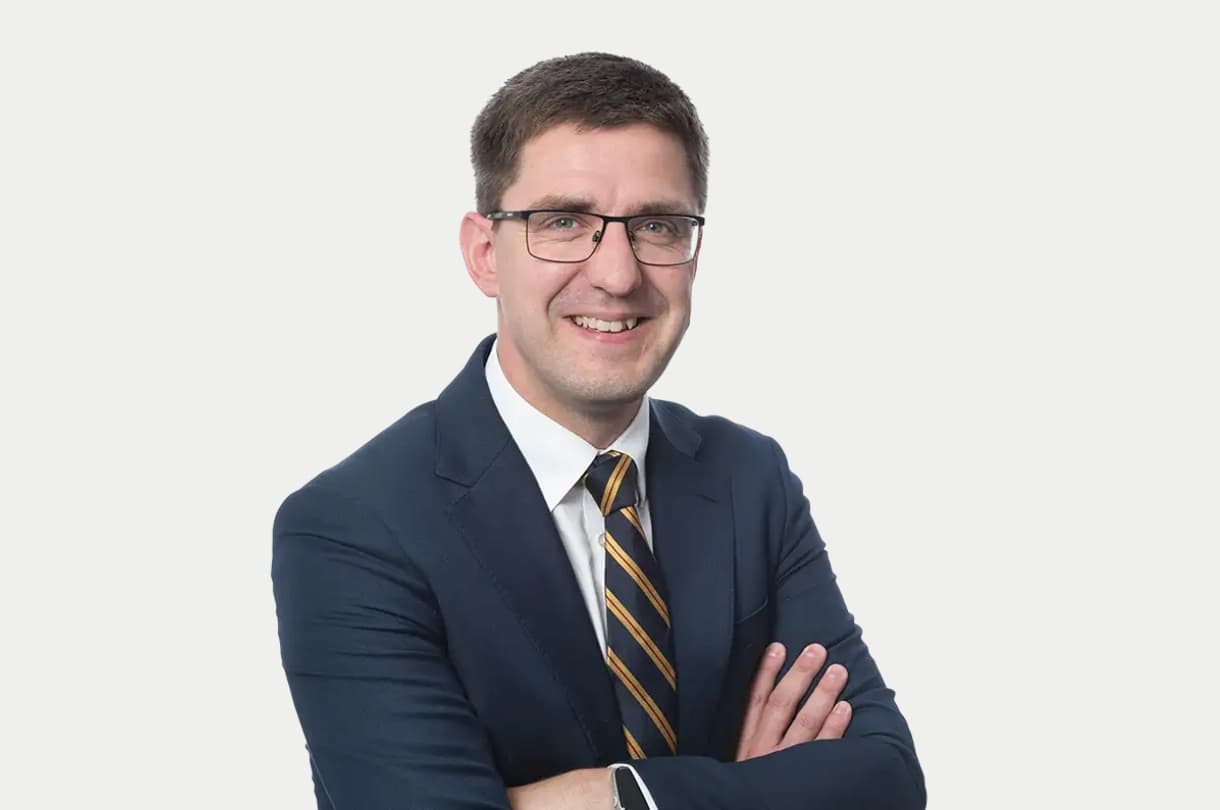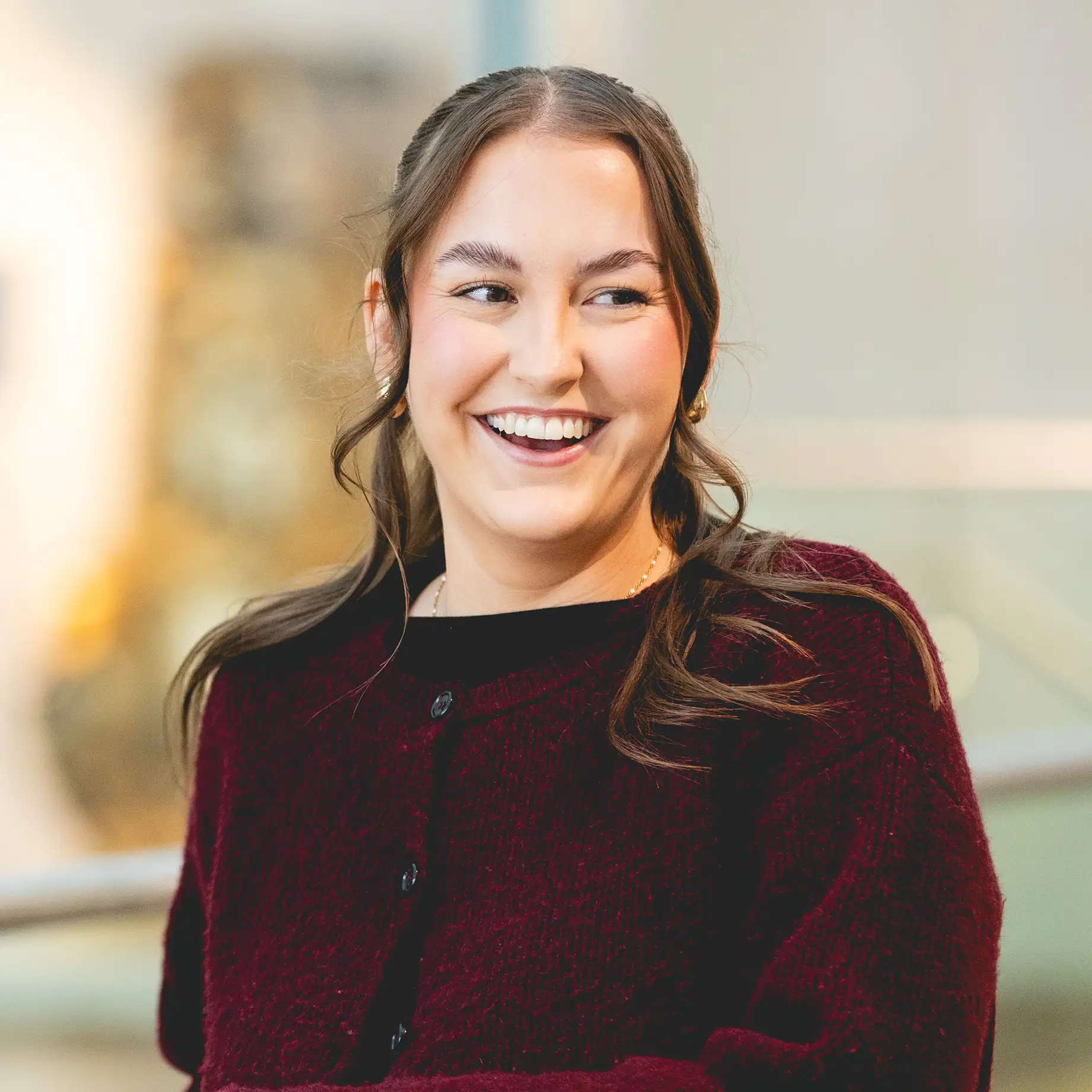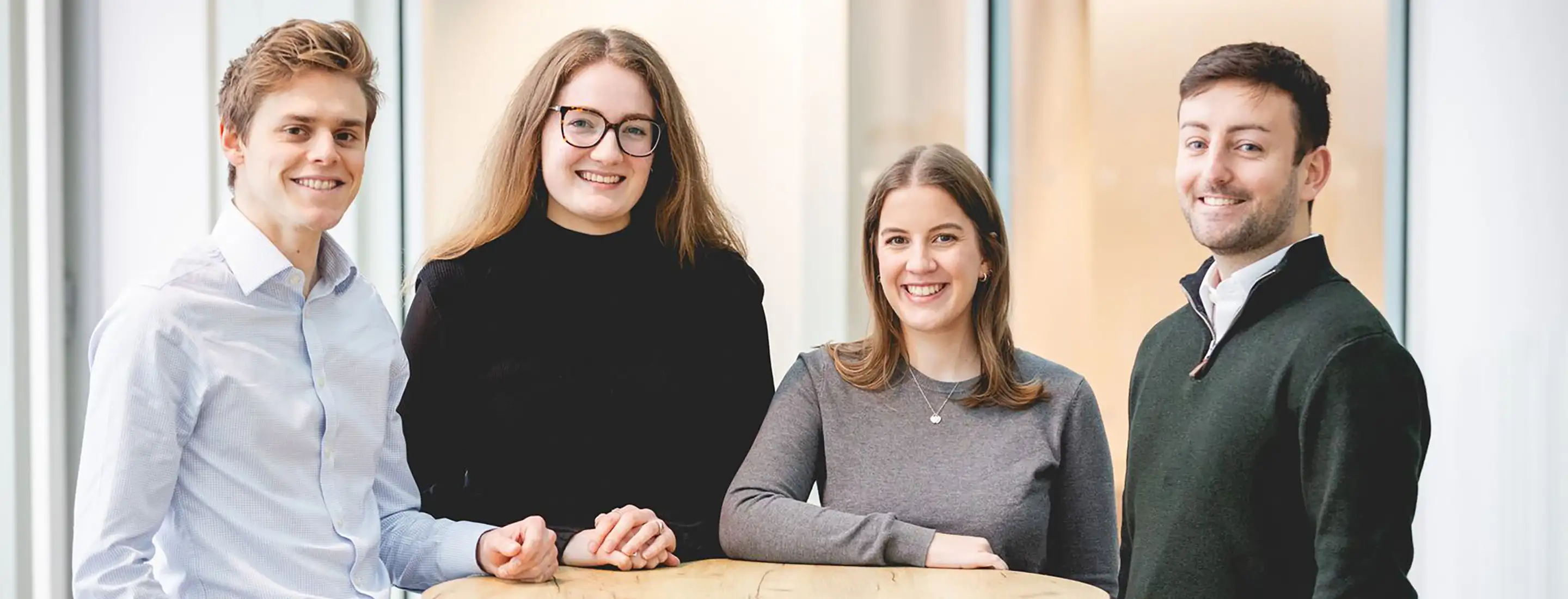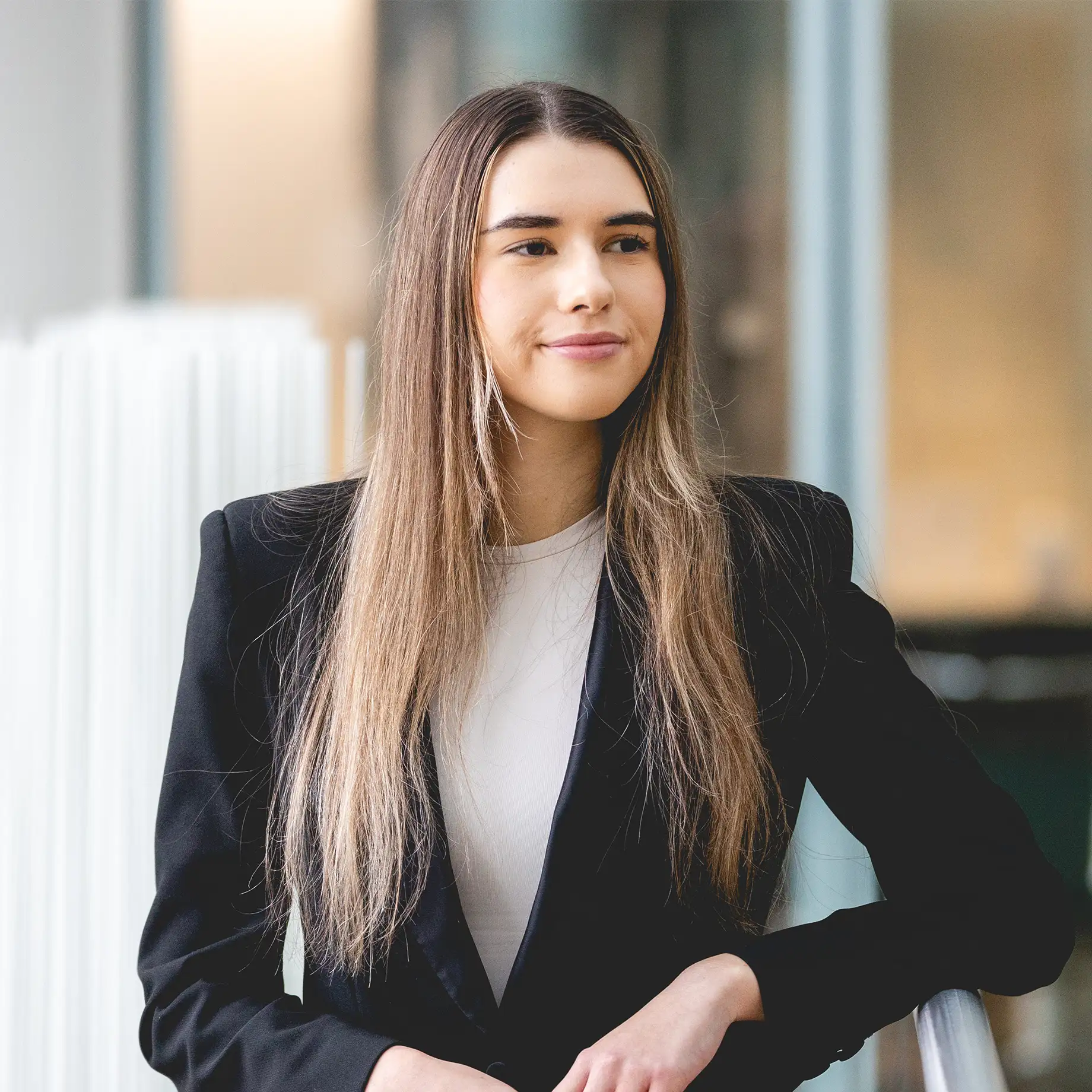Meet Rob Bridgman
Hear from Rob Bridgman, Partner in the Property Litigation team and Training Principal, about his career journey at Gowling WLG.
Listen to Rob's podcast
Applications are now closed and will re-open in October 2026 for our Vacation Scheme and Training Contract opportunities

At Gowling WLG, we believe that everyone brings something different, and that in working together we can create positive experiences and opportunities for both our people and our clients. If you’re looking for a supportive and dynamic space to flourish, our training contract is the perfect gateway.
A training contract is a route to qualify as a Solicitor in England and Wales where you undertake a two-year placement as a trainee solicitor. Under the new Solicitors Qualifying Examination (SQE) route, this two-year period counts as Qualifying Work Experience (QWE). Training contracts are a great way to start your legal career and begin to make a real impact with our clients with opportunities to go on client and international secondments. In return, we need people with a sharp mind and entrepreneurial spirit, who generate fresh ideas, make new connections and challenge how things are done.
Once you're on board, you'll spend two years developing practical legal skills and soaking in invaluable knowledge from colleagues across our firm, all whilst earning a competitive salary and getting to enjoy a range of exciting opportunities along the way. To break it down, you'll complete four six-month rotations, or 'seats', in our key practice areas, experiencing a blend of contentious and non-contentious work. We'll be here every step of the way, offering personalised support to help you grow and make an impact worth bragging about. You'll be well rewarded for your efforts. First-year salaries for trainees are £48,500 in London and £33,000 in Birmingham, rising to £53,500 and £36,000 in the second year. Plus, we offer a comprehensive benefits package.
What's in it for you?
Funmi Adeyemo: At the firm there is so much training available and not just training focussed on fee earning but more on building your soft skills, how to network properly.
Oliver Stevenson: We have a trainee enrichment programme here at Gowlings. We have been able to meet with several clients and then also partners and consultants at the firm and they have been able to share insight into their particular fields of work and, also they talk about how they interact with lawyers, what they need their lawyers for essentially and what they really value from their lawyers; and why they come to Gowlings and what kind of, what services they are expecting from us and what they like and look for in the future.
Christy Morgan: There's a real strong sense of camaraderie among our cohort. Everyone supports each other and we're not just colleagues we're friends as well.
Arianna Lorentzos: And it's beautiful being able to discuss and share that kind of experience with other people so you don't feel alone.
Chris Jeffery: That makes it really fun and really dynamic.
Christy Morgan: It's really great for knowledge sharing. It means that once one trainee has worked in a team they are going to pass on that knowledge to me. It really helps to have a peer group going through the same journey on a training contract.
Funmi Adeyemo: When I think about my experience in my training cohort the word that jumps out is collaboration. So between the trainees we all support each other. We make sure that, you know, nobody feels isolated.
Giorgio Lambrianou: We've been a really close cohort this year. It's been nice to speak to people from different backgrounds, different areas and have had different patterns to law.
Megan Wiggin: It's nice to have people who you have a shared experience with. That way you're able to all support each other especially in the lead up to qualification.
Funmi Adeyemo: During my training contract there has been a lot of cross team collaboration and this has probably been one of my favourite aspects – being able to work on a matte that everybody is contributing to and feeling part of the wider picture.
Robiul Uddin: Earlier on this year as I was practicing Ramadan often you'd finish late and it would coincide with the times you'd break fast. In the staff kitchens you'd have food there available and also towards Eid we also had the [Ithar] event where everyone came along, no just those that were practising, but also just generally for everyone in the firm; and is good to build cohesion but it also feels, it allows you to feel respected in the firm, that your culture is being appreciated.
Funmi Adeyemo: While training I found it really helpful that my supervisor usually gave me the chance to have a crack at an issue and she would give me time to have a think about it and then we could sit down and talk through it, and then she would give me feedback. Yeah, it just helped to develop my independence and just ability to think on my feet.
Giorgio Lambrianou: My supervisor has always been great at giving me challenging work, really pushing me outside my comfort zone. They're always there to make sure I'm not overwhelmed but they are keen to see me develop.
Chris Jeffery: I lean on my partner principal a lot because he is a really good sounding board, specifically with regards to my sort of career progression here at the firm. That's really helpful and he sort of provides that impartial advice.
Giorgio Lambrianou: She has been a real sort of anchor as things have been moving fast and hard throughout this training contract. She's available from a professional point of view, from a personal point of view. She's really willing to pass down her experience which has been great for me to almost learn from her lessons throughout. Not just her training contract but her pathway to becoming a partner.
Joel Butcher: I think the role of the partner principal, the usefulness of it is that they're in all of your reviews but they are a kind of constant within the reviews that are often changing in terms of your supervision and in terms of who give you feedback. It has been really useful in my mid seat review and my second seat that my partner principal was there to back me up in terms of the progress I'd made on that; and to also kind of ask questions of me and to challenge me.
Chris Jeffery: At the mid point of each seat and at the end of each seat we go through a seat review process and this means that we send out lots of feedback forms to different members of our team, different people of the firm that we've worked with and what's really good about it is it's not just, sort of, it's not just to prompt people to give us a, you know, generic paragraph of feedback. There's really specific questions that they have to answer and it gives them the opportunity to give us real feedback that we can actually work on and action.
Joel Butcher: I think the way that this firm has done constructive feedback for trainees has been good at bringing out conversations about it rather than just being words on a page.
Arianna Lorentzos: All of this feedback collated in one is something that as a trainee supports you to become better. You see how exactly you should develop, they're doing it for you, it's time taken out of their schedules for you and if its something that you can, I think, monitor and actually digest it's something that will help you become a better lawyer going forward.
Christy Morgan: Gowling WLG really invests in its trainees and we are given a lot of responsibility early on.
Robiul Uddin: I do work with a lot of autonomy which I think is beneficial in terms of gaining confidence and independence in the work I do. But also it's not that I'm left out on my own, there's always access to supervision and those in my team that are able to essentially have an open door policy if I needed something.
Chris Jeffery: One of the core pieces of work I have done here at Gowling WLG was a really big investment in a number of different very large scale logistic terminals and that is really interesting because it is something you see all the time driving around in the UK. You see these huge, big terminals and it is really fun to see what actually goes on behind the scenes in order for those things to be developed and invested in.
Joel Butcher: During my time in the property transactions team we worked on a really major acquisition of a whole portfolio of different assets. The whole team had been involved in the same transaction over a course of a couple of months and it was really nice to get to the end of that and it felt like a real accomplishment.
Arianna Lorentzos: My development has been supported through lots of business development, lots of different sorts of events. One of them being The London Stock Exchange we had just been working on a client who was listing on AIM to raise funds and it was a quantum company. So we got to ring the bell, we got to spend the day with the client, the founder, the bankers, all the different lawyers that worked on the case so it has been amazing exposure. That has involved multiple different jurisdictions.
Christy Morgan: I got to attend Solar and Storage Live in London with another trainee. We were sent by ourselves and this was actually a really great opportunity for us to build on our networking skills, be thrown in the deep end and it was really great to be trusted with that experience as well.
Katie Dunnaker: I have just done a deal which is bringing in one of the biggest fees for the Birmingham corporate team.
Megan Wiggin: One of the most exciting experiences I have had during my training contract was through my sector seat which is sport. I was able to go to a motorsport conference and this was held in London. I was able to network directly with people in-house and in a merging market which was such a cool opportunity.
Oliver Stevenson: Recently I got to attend an event as part of my role within the nuclear sector team as part of my sector seat and that was a fascinating event because I got to speak with industry leaders and essentially leading experts in the nuclear field and understand what experiences they have and what they see the future of in that industry.
Chris Jeffery: As a really high-performing culture bounce with a friendly atmosphere and I think that is evidenced by the really outstanding feedback we get from our clients and the continual work that we receive from our clients. I think what is really great about the firm and the training programme is that our supervisors, our partners they want us to get involved with the clients, they want us to build these relationships to get out there and real world and do it is a really valuable experience and I think not something you get everywhere.
Megan Wiggin: I think before I started my training contract the idea of attending a client meeting was probably petrifying but it becomes such second nature.
Chris Jeffery: You can watch all the TV shows and you can sort of you know try to you know do all of the back schemes in the world but you do not know really what to expect until it actually arrives here and so it is really nice to know that once you do get here you really get involved.
Arianna Lorentzos: I am proud to work for Gowling WLG primarily because of the scale of the work that we do. At a trainee level you will be involved from beginning to end, have a lot of responsibility on multi-million matters with clients from all different jurisdictions and all different parts of the world and that is something that not every trainee gets to experience.
Giorgio Lambrianou: The lawyers that where I am surrounded by every day are really highly ranked lawyers, really high-performing people known within the industry. Some of the projects that the team has been involved in the past are just phenomenal.
Chris Jeffery: Everyone seems really proud to work here and I think that creates a real atmosphere of pride and just enjoyment in the work. People here are just really good at what they do. You know you have a lot of lawyers here that have been here for a long time.
Robiul Uddin: I think what stands out to me about the firm are multitude of reasons, I think, first off the access to the great lawyers that we have here that are able to sit down with you, give you a hand and explain to X, Y and Z to help you understand their thought process not from just a legal point of view but a commercial point of view and the client's point of view.
Funmi Adeyemo: Everybody genuinely wants to see you win and that attitude transfers into how you are treated, the work that you are given and the support that you receive and I think that is what it is all about at the end of the day you want to work somewhere you feel supported and where you can show up as your authentic self.
Megan Wiggin: I think Gowling strikes the balance really well between high performance and having an inclusive workplace and being open and friendly. A lot of the work that we do is very demanding. It is in the legal industry and a lot of it is high value and there are tight deadlines and high expectations from clients and the firm itself but then we also work with such great supportive people.
Chris Jeffery: They know the clients really well, they know the work really and they are willing to sort of pass that knowledge on and so that makes it a really good environment to learn.
Megan Wiggin: A bit part of why I enjoy working here so much is because of the type of work that we do and the type of clients that we work with. I get to do a lot of high value work in the legal market and a lot of the clients that we work with are renowned in their industries for doing very high level work and putting out well known products which is exciting when you can see what you are working for has an impact on the market.
We understand that everyone's journey is different. That's why we're here to make your training contract as unique and fulfilling as possible. As an international, sector-focused law firm, we have four vibrant practice groups to kickstart your career: Real Estate Group (REG), Corporate, Finance & Tax (CFT), Dispute Resolution Group (DRG) and Commercial, Employment & Pensions (CEP).
Some of our available seats include:
Hear from Rob Bridgman, Partner in the Property Litigation team and Training Principal, about his career journey at Gowling WLG.
Listen to Rob's podcast
There are a number of opportunities available for professional development through pro-bono work, volunteering, firm-wide projects, and active participation in our inclusion networks.
Depending on the postgraduate route of study you are eligible for (LPC or SQE), the Solicitors Regulation Authority may require evidence of contentious work to qualify as a solicitor. If this applies to you, don’t worry – we'll provide you with the necessary experience.
Regardless of the route, we aim to ensure that all future trainees complete at least one contentious seat as part of their training contract. It's also good to note that completing a Real Estate seat is mandatory, reflecting our firm's expertise in this sector and practice.
We know it's a lot to take in, but our Early Talent team is here to support you every step of the way. We will partner with you during each seat rotation, discuss your preferences, career ambitions, and help you align with teams and practice areas to ensure you gain the most relevant experience possible.

We recruit for training contract positions two years in advance, allowing you time to complete any necessary post-graduate study before joining us.
Our training contract roles are open to graduates from any degree discipline, penultimate year law students, and final-year non-law students, with no minimum A-Level or degree classification requirements, because we know that talent comes in all shapes and sizes.
If you're offered a training contract, rest assured that we've got your back. We'll sponsor any academic study required before your employment begins and provide maintenance grants to help out with your living costs.
For non-law students, this means completing the Postgraduate Diploma in Law followed by the Solicitors Qualifying Exams. If you began your undergraduate study after September 2021, you'll need to pass the Solicitors Qualifying Exam before starting the training contract. Law students who graduated or started their LLB/conversion course before September 2021 may be eligible to complete the Legal Practice Course during the SRA's transitional arrangements. We'll discuss with you at the point of offer the routes available and what works best for you.
Hear Inge Perry, an Associate in our Birmingham office, talk about her journey into law at Gowling WLG and the varied work a trainee experiences.
Listen to Inge's podcast
We work at our best when we work together. At the end of a training contract with Gowling WLG you will have everything you need to be a qualified solicitor, but you will also have built relationships that will have a lasting impact on your career and the way you practice law.
We recruit for our training contract positions annually, with applications opening every September and closing in November. Our application process consists of four stages:
Our assessment centres are held annually in January and February, with training contracts starting two years after the offer, typically in August of that respective year.
While we'd love to welcome you right away, your onboarding will be dependent on successfully passing all stages of the recruitment process, meeting eligibility requirements, and completing post-graduate studies, including the Postgraduate Diploma in Law, and either the Legal Practice Course (LPC) or Solicitors Qualifying Exams (SQE).
